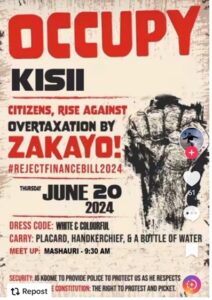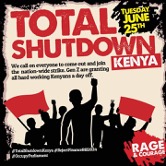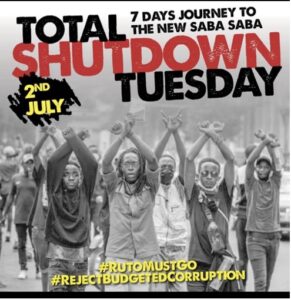Kisii, Kenya
On a Thursday night at Dan’s Hotel Restaurant in Kisii, Kenya, my fellow Kisii Konya Oroiboro Project (KIKOP) interns and I sat around a dimly lit booth with the KIKOP Project Coordinator, Anne. Our eyes were glued to the television screen across the room, watching the Kenyan Parliament’s second vote on the Finance Bill 2024. We had been to Dan’s several times – it was a quiet restaurant close to our hostel where we often enjoyed matoke (a dish of bananas and tomato sauce) and french fries – but never had we seen the crowd that then formed around the bar, faces drawn in concern as their MPs voted on whether to approve substantial tax increases across Kenya on necessities like bread. It felt like the entire city was collectively holding its breath.
“What will happen if they pass this bill?” I asked Anne as an MP on the television screen stood up to cast his vote. Riots will happen, Anne said. People will die.
Murmurs of displeasure rippled around the room as the Parliament’s decision appeared on screen. The bill had passed by over 100 votes. Now the Finance Bill 2024 only needed to pass its third reading before being signed into law by President Ruto.
As riots broke out across Kenya in the next week, we were asked to stay in our hostel. We watched from the roof as protesters marched past on the road in Kisii, their voices carried on the wind. From our removed bubble, we saw the news unfold and police brutality claim the lives of over 20 people six hours away in Nairobi, hearing pundits repeatedly chalk it up to Gen Z and their violent defense of their ideals, and President Ruto label it “anarchy.” It was simultaneously surreal and visceral – here was a movement of Kenyans protesting peacefully against a proposed 16% levy on bread, eggs, onion, and potatoes that would make it that much more difficult to get by, and they were met with water cannons and live ammunition.

In June of 2023, the Kenyan Parliament had passed a similarly controversial Finance Bill. This bill included substantial income tax increases, a mandatory housing levy, and an 8% increase in value-added tax (VAT) on petroleum products.1 Despite these measures, in December 2023, Kenya’s external debt had risen to over 6 trillion Kenyan shillings (Ksh), (about 45.5 billion U.S. dollars).2 Kenya’s Finance Bill 2024 is the latest attempt made by the Kenyan government to control the country’s debt. It includes provisions such as a 5% increase on all money transfers through Kenya’s primary mobile money service, M-PESA, a 25% excise tax on cooking oils, and a 16% VAT on bread and other staples.3
In response to the deadly protests against Finance Bill 2024, President Ruto refused to sign the contentious bill into law, and fired almost his entire cabinet. Nevertheless, Kenyans are calling for his resignation. Their discontent stems from decades of corruption in Kenyan politics, which has fostered an entrenched distrust in the government, and President Ruto in particular. In 2022, the National Ethics and Corruption Survey found that 64% of people in Kenya reported that they had paid bribes to access government regulated goods and services including procurement of business licenses, police protection, and accessing essential services like healthcare.4



Three posters for Total Shutdown Tuesdays, which have occurred every week since the initial protest against Finance Bill 2024.
In the scramble for a temporary solution, President Ruto has decided to initiate 177 billion Ksh (~1.3 billion U.S. dollars) in budget cuts to governmental entities, including suspending the office of Chief Administrative Secretaries and removing all extensions past 60 year-retirement for all civil servants.5 One thing is for certain: this is not a permanent fix.
As Kenyans continue to protest Ruto’s presidency, we are wrapping up the in-person portion of our practicum and getting ready to fly out of Nairobi. Something I have been grappling with is how to stand in solidarity with Kenyan youth, given that this internship position is a six-week visit in the midst of an issue that has spanned several years. Participating in the dissemination of information is a tangible action that I’ve taken part in, but this is bigger than a few weeks of riots – this is something that will likely continue for the next several months. Moving forward, I’ve realized that while this practicum has flown by quickly, the relationships I have built with the KIKOP staff, interns, and volunteers have nurtured a more permanent tie to Kenya, for which I am deeply grateful, and don’t take lightly. I am hopeful that the political shifts that ensue over the coming years will protect and support the health and wellbeing of Kenyans, but in the meantime, I will continue to stay on top of current events and work to support the changes that they seek in my capacity as a student, a voter, and a public health professional.
– Kait
- MZALENDO TRUST ANALYSIS OF THE FINANCE BILL 2023. May 2023. Accessed July 18, 2024. https://mzalendo.com/media/resources/Mzalendo_Trust_Analysis_of_the_Finance_Bill_2023_cqmBhgN.pdf.
- Cowling N. Kenya: External Debt 2023. Statista. March 18, 2024. Accessed July 18, 2024. https://www.statista.com/statistics/1223191/cumulative-external-debt-of-kenya/#:~:text=As%20of%20December%202023%2C%20the,of%20the%20country’s%20total%20debt.
- Magale E. Kenya protests show citizens don’t trust government with their tax money: Can Ruto make a meaningful new deal?: University of Pretoria. Kenya protests show citizens don’t trust government with their tax money: can Ruto make a meaningful new deal? | University of Pretoria. July 17, 2024. Accessed July 18, 2024. https://www.up.ac.za/faculty-of-humanities/news/post_3242063-kenya-protests-show-citizens-dont-trust-government-with-their-tax-money-can-ruto-make-a-meaningful-new-deal.
- Onyango G. Hotbed of corruption: Kenya’s elite have captured the state – unrest is inevitable. The Conversation. June 30, 2024. Accessed July 18, 2024. https://theconversation.com/hotbed-of-corruption-kenyas-elite-have-captured-the-state-unrest-is-inevitable-233562.
- Nyamori M, Langat P. President Ruto announces sh177bn budget cuts. Business Daily. July 5, 2024. Accessed July 18, 2024. https://www.businessdailyafrica.com/bd/economy/ruto-announces-sh177bn-budget-cuts–4680590.
